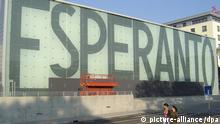久しくエスペラント活動からは離れていましたが、このたび、ひょんなことから、つくばにすんでいる学生にエスペラントを教えることになりました。
まだ生徒は一人ですが、勝手に『つくば 聴覚障害者 エスペラント ロンド 』発足と命名しました。
文字通り、生徒は聴覚障害を持っている学生で、読唇術ができる方です。
日本語での意思疎通は普通にでき、本日エスペラントを発音してもらった限り全く問題ありません。こちらのエスペラントも聞き取れます(読み取れます)!
先日初めて会ったときに、サルートン!とダンコン!だけ教えたのですが、覚えてくれていて驚き。とても興味があるとのことで、本日ファミリーレストランにて初級講習会を開きました。今年からフランス語も大学で学び始めるということで、エスペラントはフランス語にすごい似てるから、フランス語も学びやすくなるよと言うと、とても喜ばれていました。
今日は導入ということで、Wikipedia のエスペラントページを読んできていただいた上で、アルファベットからあいさつ、動詞の活用などエスペラントの概要を例文を交えながら話しました。新しい文法など説明するごとに、興味を持ってくれて、その興味の方向に合わせて話を広げていきました。(たとえば、あいさつでBonan nokton を説明して、そこで -n が気になったので、Mi amas vin. やVi amas min. に繋げ、Cxu vi amas min? と広がって、Cxu をつけると疑問文になるのですね?と直感的に分かったらしく、Cxiu floro. からCxiuj floroj. になり、-j について他の例題を出したりという、展開になりました。)
次回はまだ未定ですが、このまま続けていきたいです。
目標は、海外の青年大会に参加すること!




